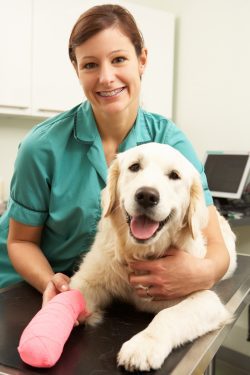Caring for Your Senior Pet: A Gentle Approach
No matter how old or experienced you are, watching your dog or cat grow old never gets easier.
Our pets are family, and watching them change and face the challenges of aging can take a heavy emotional toll ‒ but there are ways you can cope better and help your furry loved one feel comforted and loved every step of the way.

When it comes to caring for your senior pet, we recommend taking a compassionate and gentle approach. In this article, West Spartan Animal Hospital will explore everything you need to know about caring for older dogs and cats.
Based in Greer, SC, our animal clinic welcomes dogs and cats of all ages throughout Greer, SC and the surrounding areas. Contact us today if you’d like to schedule a wellness visit with one of our veterinarians.
Do Your Research
There’s no predicting what types of challenges your dog or cat will face in old age, but you can better prepare by understanding more about their breed and expected lifespan.
Not all dogs have the same lifespan. Some breeds live longer than others, while some develop health problems earlier in life. Larger dogs, like Great Danes and Mastiffs, for example, tend to have a shorter lifespan. They generally don’t live longer than ten years, while smaller dogs can live upwards of 13+ years.
With cats, owners can typically expect their feline companions to live between 10 to 20 years, as the lifespan of breeds doesn’t vary quite as much as with dogs.
Know Common Health Problems in Senior Dogs & Cats
Regardless of the expected lifespan for your particular breed of dog or cat, it’s essential to understand the types of health problems that can arise in older pets. Geriatric pets are more susceptible to developing:
- Heart disease
- Cancer
- Liver disease
- Diabetes
- Arthritis
- Kidney disease
Some of these conditions are more common in cats than in dogs ‒ and vice versa ‒ and the risk of them occurring increases with age. The sooner you can identify early signs of disease or aging, the sooner you can get your pet the medical care and attention they need for a longer and higher quality of life.
Changes in your dog or cat’s personality and interest levels are the telltale signs that something may be wrong with their health. Schedule an appointment with a veterinarian if your pet is also exhibiting appetite changes, significant weight loss or gain, excessive urination, drinking, and/or drooling, or increased difficulty moving.
Keep an Eye on Behavioral Changes
Like humans, pets go through many changes in health, personality, and behavior as they age.
Sound sensitivities or decreased responsiveness to your commands may indicate hearing loss, for example. If your dog or cat begins to bump into objects frequently or shows signs of fear and hesitation going up or downstairs, they may be experiencing vision loss. Dogs and cats can also experience a decrease in appetite or show less of a desire to participate in activities they once enjoyed.
House soiling, irritability, increased aggression, or isolation are also some other behavioral changes that can occur with age ‒ but there could be underlying diseases or conditions to blame, so always keep up with your pet’s annual or bi-annual wellness visits and blood work.
Nourish Your Pet
Proper nutrition is essential at all stages in an animal’s life, but as your dog or cat gets older, they’re more likely to develop nutritional deficiencies and subsequent health problems.
As their bones and muscles grow weaker, geriatric pets require foods with adequate protein and anti-inflammatory ingredients. Foods high in fiber and antioxidants will also better protect your pet’s skin, coat, and digestion.
Work closely with your veterinarian to navigate your pet’s unique nutritional needs. Some pets may need to consume lower levels of calories or protein, while others may require special foods or supplements. If you’re unsure of your pet’s nutritional needs, or if it’s been a while since they had blood work done, contact West Spartan Animal Hospital today.
Stay Active
Older pets are more likely to slow down, sleep more, and play less as they age ‒ but keeping them active can help them maintain their health, well-being, and quality of life.
Go for shorter walks with your dog. Monitor how long they can walk until they begin to slow down or limp. Don’t force them to walk further if they are exhibiting signs of pain or fatigue. To keep them stimulated, explore new locations together, like a nearby hiking trail or park.
Does your cat play in a tall jungle gym? Once they reach old age, consider replacing this with a smaller and shorter jungle gym to limit jumping and tumbling-related injuries. If your cat enjoys going outdoors or climbing trees, limit how frequently they go outside to prevent injuries or introduce them to new indoor toys.
The bottom line: The more care and attention you show your pet, the happier and more stimulated they’ll be. Talk to them and play with them every day and remind them of how much they are loved ‒ this can be the best medicine for an older pet.
Caring for Our Pets As They Get Older
Watching our pets grow old is challenging and very often heartbreaking – but by taking a gentle approach to caring for your senior pet, you can make their remaining years as enjoyable, loveable, and happy as ever.
Are you the owner of an older cat or dog? Is your pet showing signs of aging? West Spartan Animal Hospital invites pet owners throughout Greer, SC, to contact us today. We’re happy to schedule a wellness visit, routine blood work, and an examination of your furry family member!




